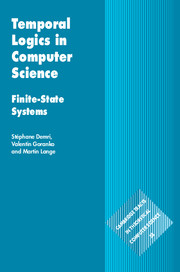15 - The Game-Theoretic Framework
from PART IV - METHODS
Published online by Cambridge University Press: 13 October 2016
Summary
In this chapter we will develop a game-theoretic approach to themain decision problems for temporal logics. We will present model-checking games and satisfiability-checking games and use them to characterise the model checking and the satisfiability-checking problem for temporal logics. These games are defined by means of an arena on which two players perform plays. The characterisations then relate the model-checking problem, i.e. the question of whether a given state of an interpreted transition system satisfies a temporal formula, to the existence of a winning strategy for the proponent player in the respective modelchecking game. Likewise, the satisfiability problem, asking the question of whether a given temporal formula is satisfiable, corresponds to the question of whether the proponent player has a winning strategy in the respective satisfiability game.
These game-theoretic characterisations are of particular interest in the context of program verification. Consider the model-checking problem which is used to prove whether some (abstracted) system is correct with respect to a property formulated as a temporal formula. Ifmodel checking returns true, i.e. the property is satisfied and the system is therefore verified, then one can continue the system development process and consider another property for instance. However, if the property is not satisfied, i.e. model checking has returned false, then typically the system needs to be redesigned so that the error causing the nonsatisfaction of the formula is rectified. In order to do this successfully, it is important to know why the property is not satisfied. Game-theoretic characterisations are designed to yield such explanations: the certificate for nonsatisfaction of a property is a winning strategy for the opponent player, called here Refuter and denoted by R. Failure certificates are also important in satisfiability problems, for instance in checking whether a program specification made up of several parts is realisable.
While satisfiability of a temporal formula of BML seems easy to certify by giving a model, it is usually more difficult for logics like CTL and LTL, and much more so for complex logics like CTL* and Lμ. Again, winning strategies in satisfiability games yield certificates that can be used for building such satisfying models.
Before we actually consider temporal logics and their associated games, we introduce the game-theoretic framework abstractly and present the basic concepts like players, plays, winning conditions, winning strategies, etc.
- Type
- Chapter
- Information
- Temporal Logics in Computer ScienceFinite-State Systems, pp. 625 - 715Publisher: Cambridge University PressPrint publication year: 2016



